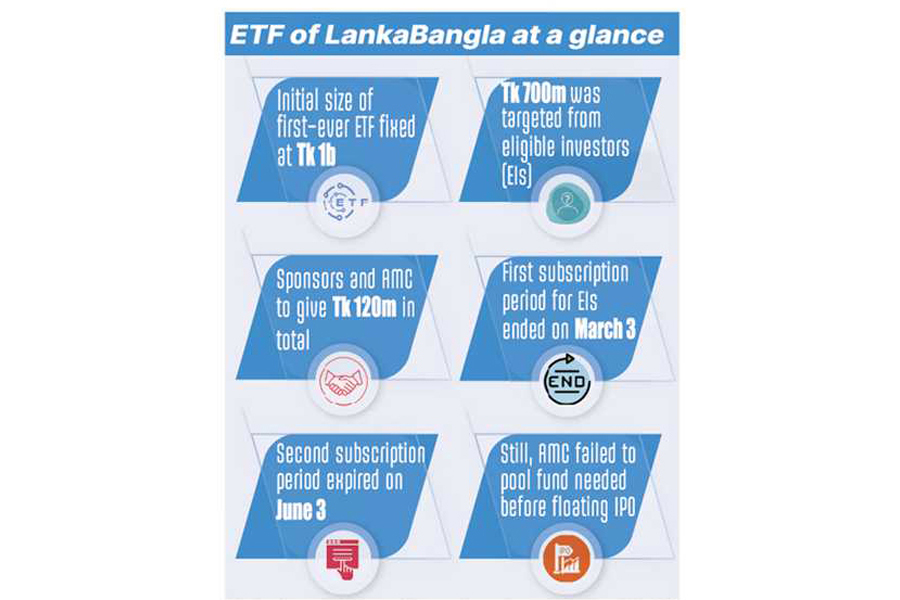
Published :
Updated :

Nearly nine months after getting the regulatory consent, LankaBangla Asset Management is yet to float the country's first-ever Exchange Traded Fund (ETF) namely LB Multi Asset Income ETF because of apathy among eligible investors.
In October last year, the Bangladesh Securities and Exchange Commission (BSEC) approved the asset management company's (AMC) proposal to launch the ETF with an initial size of Tk 1 billion.
The target was to raise Tk 700 million from eligible investors (EIs) through private placement while the sponsor would contribute Tk 100 million, the AMC Tk 20 million, and the remaining Tk 180 million was set to be pooled through an IPO.
The fund could start its IPO (initial public offering) subscription and complete the subsequent listing on the Dhaka bourse if it could at least gather Tk 500 million from the EIs. In that case, the public portion would have been raised to Tk 380 million from Tk 180 million.
The subscription period set for the first time for private placement ended on March 3 this year. It was then extended by three months to June 3.
Yet, the money collected so far from eligible investors falls far short of the minimum requirement.
Hence, LanakaBangla Asset Management has recently appealed to the securities regulator, seeking further extension of the subscription period.
An ETF is a basket of securities, units of which are traded on an exchange just like stocks. It can be actively managed or passively managed.
In actively managed funds, portfolio managers decide which securities to invest in, while a passive ETF mirrors an index, with investments in all companies on the index in accordance with the weight of the companies on the index.
The ETF proposed by LankaBangla Asset Management is actively managed.
To diversify the country's stock market, the securities regulator finalised the rules of ETF in May 2017. A gazette on the rules was published in June of the same year.
But the market has not offered a single ETF to investors in the last seven years.
Another ETF was proposed by Shanta Asset Management. Officials of the company said they were still designing the features of the ETF.
Arif Khan, vice chairman of Shanta Asset Management, put the blame on persistent erosion of the country's equity market for the delay in the launching of new products, including the ETF.
The market has shrunk by around 20 per cent this year. Portfolios of individual investors have endured losses as much as 30 per cent in assets' market value.
"Under the circumstances, who will give us funds? Considering the safety of investments, investors have continued to inject money into Treasury bonds," Mr Khan said.
Investors will not regain faith in the market unless it becomes stable and this stability can be attained only if the market gets depth through listing of good companies.
Explaining characteristics of the ETF separate from mutual funds, an official of LankaBangla Asset Management said the market price of the units of the ETF would not go above 10 per cent and below 10 per cent of the net asset value (NAV).
Three authorized participants have been appointed to ensure price movements within the stipulated limits. They will sell units if the price goes above 10 per cent and will purchase units if the price goes below 10 per cent of the NAV to keep the liquidity flow alive.
Secondly, the management fee of the ETF will be charged at a flat rate of 1 per cent of the fund's size, while management fees for MFs vary depending on the fund size.
Mr Khan said the delay in floating ETFs would prove to be a good thing for asset management companies and investors. Had the ETF been floated unitholders would have witnessed consistent erosion of their investments.
Mr Khan is now very optimistic about the market's return. He believes it would be convenient for any asset manager to float an ETF as the market gains a growth momentum.
Preferring anonymity, an official of LankaBangla Asset Management said investors lacked understanding about new products.
A senior official of the Dhaka Stock Exchange (DSE), who is involved in bringing new products to the market, said little to no publicity was the reason behind poor response to new products.
"There are so many eligible investors in the market. The ETF's subscription would have been completed if only a small segment of those investors showed interest."
LankaBangla Asset Management set the benchmark yield of the ETF as equivalent to the return from 10-year Treasury bonds. The DSE official said the rise in the FDR (fixed deposit receipt) rates might be another reason behind investors' little response to the ETF.
mufazzal.fe@gmail.com


 For all latest news, follow The Financial Express Google News channel.
For all latest news, follow The Financial Express Google News channel.